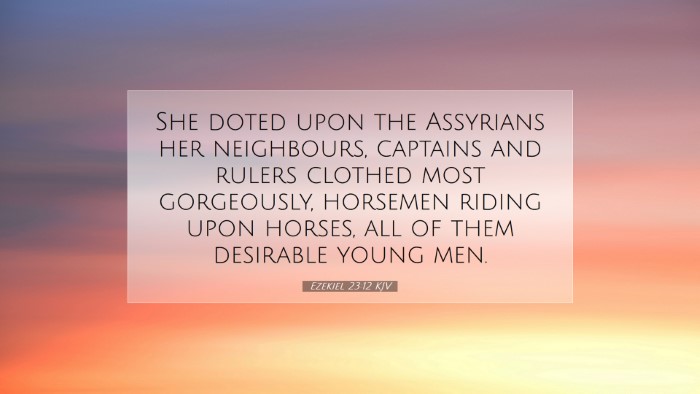Ezekiel 23:12 - Commentary Summary
Verse Context: The verse states, "She doted upon the Assyrians, her neighbours, captains and rulers clothed most gorgeously, horsemen riding upon horses." This comes from a larger passage in which Ezekiel uses symbolic language to describe the unfaithfulness of Israel through the metaphor of two sisters, Oholah and Oholibah.
Overview of the Passage
This chapter focuses on the themes of idolatry, unfaithfulness, and the consequences that come from forsaking God’s covenant for the allurements of foreign nations. The Assyrians, representing both a political and cultural seduction, serve as a stark warning against reliance on human power instead of divine providence.
Commentary Insights
Matthew Henry’s Commentary
Matthew Henry emphasizes the metaphorical representation of the two sisters as the northern kingdom of Israel (Oholah) and Judah (Oholibah). He notes that this verse highlights how Israel became infatuated with the power and splendor of Assyria, indicating a profound spiritual decline.
- Idolatry and Affection: Henry suggests that the term "doted" represents a misplaced affection that is akin to idolatry, showcasing Israel's tendency to seek validation from nations that did not worship Yahweh.
- Symbolism of Assyria: The Assyrians are depicted with "gorgeous" attire which can be likened to the lures of worldly power and temptation that draw people away from their commitments to God.
- Consequences of Infatuation: Henry warns of the repercussions that come from such unfaithfulness, stressing that reliance on political allegiances resulted in spiritual compromise.
Albert Barnes’ Commentary
Albert Barnes provides insights into the significance of the Assyrians as not merely a political entity but as symbols of luxury and idolatry. He underscores the allure of external appearances that led to moral degradation.
- Temptation of Neighboring Nations: Barnes points out that the allure of the Assyrian rulers was not just their military might but their opulence and the temptation they posed, reflecting the broader theme of humanity’s constant temptations by appearances.
- Warning Against Dependency: The passage serves as a reminder for believers to look closely at where they place their trust, emphasizing that dependence on worldly kingdoms can lead one away from the faithfulness required by God.
- Moral and Spiritual Reflection: Barnes encourages readers to reflect on their attachments and affections—are they drawn away by the richness of the world, much like Israel was by the allure of Assyria?
Adam Clarke’s Commentary
Adam Clarke views this verse as a cautionary tale against the vices of craving power and luxury. He articulates how the verse describes not just an emotional connection but a deep-seated spiritual corruption brought on by these attractions.
- Understanding the Motive: Clarke interprets the term “doted” as an expression of an illicit desire; this points to a habitual indulgence in behavior that is contrary to the holiness God demands of His people.
- Historical Context: He grounds this infatuation in historical realities, explaining how alliances with Assyria may have seemed advantageous politically but were ultimately destructive spiritually for the Israelites.
- Modern Application: Clarke’s commentary extends to contemporary contexts, urging believers to guard their hearts against similar temptations—be they through politics, materialism, or ungodly desires—cautioning that these lead away from true fidelity to God.
Critical Themes
1. Idolatry and Spiritual Infidelity
The primary theme in this verse is spiritual infidelity. The image of desiring the Assyrians represents how Israel turned away from God to pursue foreign idols and alliances. This reflects a breach of covenant and highlights God’s call for loyalty.
2. The Allure of Worldly Power
Another critical theme is the allure of worldly power and wealth. The detailed imagery of "gorgeous" apparel and "horsemen" indicates the seduction of political strength and opulence that threatens the integrity of one's faith.
3. Consequences of Unfaithfulness
As the commentaries indicate, unfaithfulness leads to dire consequences. The ultimate call is to recognize that misplaced trust results in spiritual decay and divine judgment, reminiscent of Israel’s historical disobedience.
Conclusion
In reflecting on Ezekiel 23:12, we are reminded of the perils of idolatry, the seductive nature of worldly temptations, and the importance of maintaining a heart aligned with God's truth. The commentaries from Henry, Barnes, and Clarke all serve to deepen our understanding of how ancient texts still resonate in our contemporary struggles against the distractions of modern life.
As we engage with this text, let us heed the warnings presented: to prioritize our loyalty to God above all else, rejecting the allure of worldly powers, and ensuring our faith roots itself not in transient glories but in enduring fidelity to the Creator.


